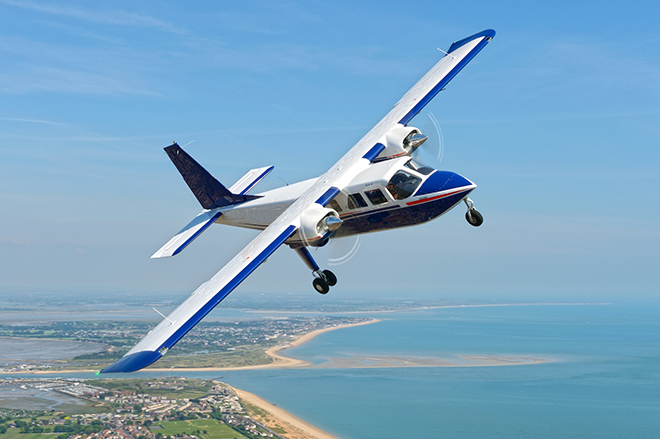THE GOVERNMENT has backed plans to develop hybrid-electric propulsion for commercial aircraft with a £9 million grant to a project led by researchers at Cranfield.
Cranfield Aerospace Solutions, a leading aircraft integrator in green commercial aviation, will use the funding to design, manufacture and integrate a hybrid-electric propulsion system into a nine-seat Britten-Norman Islander aircraft, typically used on short flights such as island-hopping routes.
The grant for the initiative – named Project Fresson – comes through the ATI Programme, a partnership of the Aerospace Technology Institute, the Department for Business, Energy & Industry Strategy, and Innovate UK to maintain and grow the UK’s competitive position in civil aerospace design and manufacture.
Its success may mean that the first commercial passenger flights using electric aircraft will take place in the UK.
The project’s partners include Rolls-Royce, which will supply the power management system. It will be joined by the Denis Ferranti Group, Delta Motorsport, providing battery packs, the Warwick Manufacturing Group run by the University of Warwick and aircraft manufacturer Britten-Norman.
CAeS’s parent Cranfield University will be researching key technology solutions vital for the 30-month project. The results can be European Aviation Safety Agency/Civil Aviation Authority certified, clearing the way for the first passenger-carrying sub-regional aircraft capable of all-electric flight, said CAeS chief executive Paul Hutton.
“The strength of the industrial partners involved in this project, are underpinned by the world-class aerospace/manufacturing research capabilities of Cranfield University,” he added. “This is going to accelerate our green transport revolution.”
Professor Iain Gray, Cranfield University’s director of aerospace, said: “Cranfield University is recognised around the world for its Aviation Systems Integration capability and is focused around research and development of zero-emission technologies. We are pleased to be a technology partner on Project Fresson which is at the forefront of turning the commercial use of electric aircraft into a reality.”

The Fresson project supports Rolls-Royce’s commitment to making aviation more sustainable. The company is already working on a new concept in aircraft-level power distribution control that optimises all the elements of the power and propulsion system.
The electrification of flight is important to Rolls Royce’s sustainability strategy, said Alan Newby, its director, aerospace technology and future programmes. “We are excited to be involved in this project, which combines our commitment to support the de-carbonisation of aviation with our ability to solve complex problems with pioneering solutions.”
CAeS plans to certify the modification through the EASA, allowing the current operators of the 400-plus B-N Islander aircraft to convert their planes, reducing operating costs and their carbon footprint.
Britten-Norman chief executive William Hynett said: “Our aircraft makes an ideal launch platform for this programme due to its renowned reliability and adaptability. We remain highly enthusiastic about the prospects of bringing this important capability to our vitally important short-sector market.”

